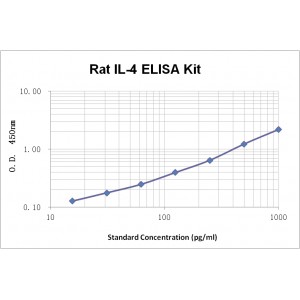More info
Assay Range | 15.6--1000 pg/mL |
Sensitivity | 1.0 pg/mL |
Specificity | No cross-reaction with other related substances detected |
Size | 96T |
Storage | Store at 2 - 8ºC. Keep reconstituted standard and detection Ab at -20 ºC |
Assay Principle | Sandwich ELISA |
Sample Volume | 100 µL final volume, dilution factor varies on samples |
Sample Type | serum, plasma or cell culture supernatant |
Detection Method | Chromogenic |
Kit Components
1. Recombinant Rat IL-4 standard: 2 vials
2. One 96-well plate coated with Rat IL-4 Ab
3. Sample diluent buffer: 12 mL - 1
4. Detection antibody: 130 µL, dilution 1:100
5. Streptavidin-HRP: 130 µL, dilution 1:100
6. Antibody diluent buffer: 12 mL x1
7. Streptavidin-HRP diluent buffer: 12 mL x1
8. TMB developing agent: 10 mL x1
9. Stop solution: 10 mL x1
10. Washing solution (20x): 25 mL x1
Background
Interleukin 4 (IL-4), also known as B-cell stimulatory factor 1 (BSF-1), Binetrakin, Lymphocyte stimulatory factor 1, Pitrakinra, is a cytokine belonging to the IL-4/IL-13 family. Rat IL-4 is synthesized as a 147 amino acid (aa) precursor protein containing a 24 aa residue signal peptideand a 123 aa residue mature protein with four potential N-linked glycosylation sites and seven cysteine residues, six of which participate in the formation of three intramolecular disulfide linkages in this protein.
IL-4 transduces its signals by binding to two specific receptor complexes. One type of functional IL-4 receptor complex consists of the IL-4 receptor (IL-4 R) and the common γc chain which also is a component of the receptor complexes for IL-2, IL-7, IL-9, and IL-15. It has also been proposed that IL-4 might bind to another type of functional IL-4 receptor complex, consisting of the IL-4 R and the IL-13 Rαwhich also serves as a receptor complex for IL-13. In addition to the membrane-bound form of IL-4 R, a naturally occurring soluble form of IL-4 R has been identified in human and mouse biological fluids and in mouse cell culture supernatants. IL-4 plays an important role in regulation of isotype switching, differentiation of precursor T helper cells to the Th2 and induction of IgE production in B lymphocytes. In addition, IL-4 has also been shown anti-tumor activity both in vivo and in vitro.


